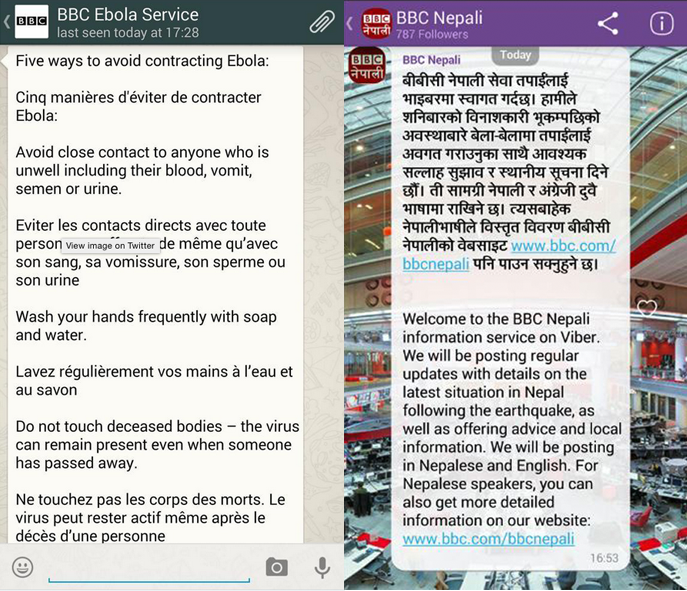Secure your place at the Digiday Publishing Summit in Vail, March 23-25
In an increasingly mobile world, the BBC is going where the eyeballs are: chat apps.
The BBC’s latest effort comes via chat app Viber, which the broadcaster is using to send news and information to Nepali people affected by this week’s earthquake. The alerts, which the BBC experts to change over time information, have so far included news, information and safety advice.
Viber is the latest in a line of chat apps the BBC has experimented with as it tries to find new ways of reaching new people around the world — particularly those in countries where mobile usage has started to take off.
“We’ve taken the strategic view that these technologies are already hugely significant and are only going to rise in significance,”said BBC mobile editor Trushar Barot. “Millions more people are buying their first smartphones, and we know that their first contact with the Internet is going to be through these chat apps.”
That logic has led the BBC to create accounts and alert services built on apps such as WhatsApp, WeChat and South Africa’s Mxit — all of which have been aimed at specific countries and regions.
Using WhatsApp last year, for example, BBC created an account dedicated to sending people in West Africa updates and health alerts about Ebola. Over 22,000 people subscribed to the channel. It’s been similarly successful with efforts in India, where it used WeChat to cover elections last spring. The effort, which included news nuggets and alerts written in both English and Hindi has attracted 15,000 subscribers so far, Barot said. Elections coverage was also key BBC’s 2014 experiment with Mxit, a feature phone chat app popular in South Africa. Barot said the idea was to use the app to boost its reach among young people, which are unlikely to read the BBC in any other way. That effort BBC netted 50,000 subscribers in two weeks.

The BBC isn’t the only publisher to latch on to chat apps. The Wall Street Journal tapped Line for its Charlie Hebdo coverage earlier this year, The Huffington Post U.K. started its own politics-focused WhatsApp channel last summer, and NowThis has experimented with both Kik and Yo.
While there’s no shortage of chat apps, the BBC focuses its regional chat app experiments on the apps with the biggest audiences. WeChat has 70 million users in India alone, WhatsApp has 700 million users globally and Viber’s reach in Nepal exceeds 3 million people. “We knew we would be reaching a big audience through that app,” Barot said of Viber.
The challenge is that chat apps are built for one-to-one communications, not broadcasting. This creates headaches for publishers, who are forced to work around the apps’ inherent limitations. WhatsApp, for example, caps its broadcast lists at 256 people, forcing publishers to create multiple lists to reach subscribers.
Barot said that this was in part why Viber was such an easy sell. Even before BBC approached it, the app had already opened itself up to publishers via its Public Chats feature, which lets celebrities, brands and publishers push out alerts to large groups of followers at once. That, coupled with support from Viber itself, made a difference: Its Viber channel took just 36 hours to put together. Its WhatsApp effort, in contrast, took a week.
“We’ve gotten better at understanding and accepting where the strengths of the platforms are and maximizing that rather than trying to put a lot of time and energy to make them work in a way they’re not designed to,” Barot said.
More in Media

Media Briefing: As AI search grows, a cottage industry of GEO vendors is booming
A wave of new GEO vendors promises improving visibility in AI-generated search, though some question how effective the services really are.

‘Not a big part of the work’: Meta’s LLM bet has yet to touch its core ads business
Meta knows LLMs could transform its ads business. Getting there is another matter.

How creator talent agencies are evolving into multi-platform operators
The legacy agency model is being re-built from the ground up to better serve the maturing creator economy – here’s what that looks like.





